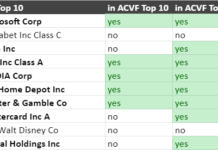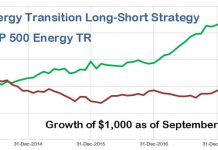Marc Gunther
 Bill McKibben’s groundbreaking Rolling Stone story (Global Warming’s Terrifying New Math) and 350.org’s “Do the Math” divestment campaign raise important and difficult questions about fossil fuels. One that is starting to roil the world of socially-responsibly investing is this: How should mutual funds that strive to be “green” or “sustainable” or “socially responsible” deal with the fossil fuel companies in their portfolios? Should they divest, as McKibben argues?
Bill McKibben’s groundbreaking Rolling Stone story (Global Warming’s Terrifying New Math) and 350.org’s “Do the Math” divestment campaign raise important and difficult questions about fossil fuels. One that is starting to roil the world of socially-responsibly investing is this: How should mutual funds that strive to be “green” or “sustainable” or “socially responsible” deal with the fossil fuel companies in their portfolios? Should they divest, as McKibben argues?
That was the topic of a column I wrote last week for the Guardian Sustainable Business, which generated some noteworthy responses. It’s part of the British newspaper The Guardian, which has one of the most popular English language media websites in the world. Here’s how the column begins:
“We’re going after the fossil fuel industry,” Bill McKibben tells about 1,800 cheering fans in a Washington, DC, theatre. “They’re trying to wreck the future, so we’re going after some of their money.”
Al Gore notwithstanding, McKibben – an author, academic and founder of the grassroots climate group 350.org – is America’s leading environmental activist. His 21-city Do The Math tour begins a campaign to persuade colleges, churches, foundations and governments to divest their holdings in coal, oil and natural gas companies.
“It does not make sense,” McKibben tells the Washington audience, “to invest my retirement money in a company whose business plan means that there won’t be an earth to retire on.”
He’s right about that, but the divestment campaign raises a thorny question: where can investors who worry about climate change put their money?
Divest for our Future, 350.org’s divestment website, recommends “environmentally and socially responsible funds“. The trouble is, the biggest and best-known mutual funds that call themselves environmentally and socially responsible also invest in fossil fuel companies. They evidently haven’t heard McKibben’s message.

Is this green? |
The column–you can read the rest here–goes on to report that the Parnassus Equity Income Fund holds about 14% of its assets in oil, natural gas companies and electric utilities that burn fossil fuels, that the TIAA-CREF Social Choice Equity Fund owns shares in dozens of oil and gas firms including Hess, Marathon and Sunoco, and a pair of shale gas giants, Devon Energy and Range Resources, that the Calvert Equity Portfolio has about 10% of its portfolio in fossil fuels, including Suncor, which says on its website that it was “the first company to develop the oil sands, creating an industry that is now a key contributor to Canada’s prosperity,” and that the Domini Social Equity Fund has, among its top 10 holdings, Apache Corp, an oil and gas exploration and production company.
Are you surprised to learn that these funds invest in oil and gas companies, including those in the Canadian Tar Sands? Perhaps naively, I was.
If you believe McKibben’s math, as I do and it hasn’t been challenged by the fossil fuel industry–the idea of exploring for new oil and gas is folly. Using data from the Carbon Tracker Initiative, McKibben estimated that the earth could burn another 565 gigatons of carbon dioxide and stay below 2°C of warming. Fossil fuel corporations have 2,795 gigatons in their reported reserves – five times the safe amount. We don’t need any more.
My Guardian column–which is the first of a series that I’ll be doing for the newspaper–was intended to highlight the fact that SRI funds weren’t as clean and green as many probably believe them to be. It didn’t set out to answer the question in the headline: Where can investors who worry about climate change put their pension?
After the story ran, I heard from the managers of two socially-responsible funds that, as a matter of policy, work hard to stay away from fossil fuels.
Carsten Henningsen, chairman of Portfolio 21 Investments, emailed me to say that his company for the most part avoids fossil fuel companies, including those that extract natural gas (but not those that burn it). Here’s the policy:
Portfolio 21 Investments does not invest in companies directly involved in the extraction and production of fossil fuels ?coal, oil, and natural gas. Natural gas has a lower greenhouse gas (GHG) emissions profile than either oil or coal. Despite natural gas’s lower GHG profile, it is a combustible mixture of hydrocarbon gases, formed primarily of methane. Deposits are found at varying depths beneath the Earth’s crust, both onshore and offshore, requiring the use of both conventional and unconventional extraction methods. Given the elevated environmental risks associated with extraction, Portfolio 21 Investments will not invest in extraction and production. However, due to the current limitations of renewables (in terms of current capacity and financial attractiveness), and the lower GHG profile of natural gas, Portfolio 21 Investments will invest in companies involved in the transmission and distribution of natural gas as well as in utilities that utilize natural gas as a fuel source.
I also heard from Leslie Samuelrich, senior vice president, Green Century Capital Management, a fund comp
any that was started in 1991 by environmental groups. She writes:
Investors concerned about climate change should look to use their investments as a vehicle to address the problem.
That’s why Green Century offers a mutual fund, the Green Century Balanced Fund (GCBLX), that is fossil fuel-free.
The Balanced Fund is an actively managed fund that holds a mix of stocks and bonds that meet tested environmental criteria. The Fund does not invest in the exploration, drilling, refining or production of oil, gas or coal. The Balanced Fund provides an opportunity to invest in sustainable companies and environmental innovators. The Fund also seeks to provide competitive returns to its investors and has a four star overall rating from Morningstar.
I’m not offering investment advice here, of course, but I do think socially-conscious investors should look into their funds’ portfolios, which are made public twice a year. If you want your mutual fund to divest fossil fuel companies, let them know.
A final thought. I have a lot of respect for the people I know at Calvert and Domini (where I’ve been an investor). They both do lots of shareholder activism around environmental issues. Here, in full, is the thoughtful reply that I got from Domini’s Adam Kanzer when I asked him about this issue:
Of course we’re reconsidering our approach to fossil fuels. We would expect anyone who has taken a close look at the science to regularly reassess their exposure to fossil fuels. Bill McKibben is absolutely right to focus attention on fossil fuel investment, and I fear his math is correct. Personally, I think the Carbon Tracker report is one of the most important reports I’ve read in a long time. Investors – and society – ignore these facts at their peril.
The question for us is how we can be most effective in our role as investors. How can we adequately reflect both our shareholders’ desires and our own principles, and also have a positive impact on climate? These discussions are ongoing and will continue. We believe a range of strategies need to be brought to bear on the problem. We currently exclude individual companies that, in our view, fail to responsibly address the key sustainability challenges they face. We exclude industries where we believe the core business model is inherently destructive, and incapable of reform. Nuclear weapons are a good example. In the energy sector, we currently exclude coal, nuclear and the major integrated oil companies. With respect to coal, we also generally exclude coal-based utilities, railway companies that derive most of their revenue from transporting coal, and we have also excluded marine shipping companies for which transporting oil and coal is a substantial part of their business. We also seek to exclude companies that derive significant revenues from tar sands development.
Our funds’ energy exposure is currently tilted toward natural gas, which we continue to view as a ‘transitional’ fuel towards a renewable energy future. At least for the near term, the lower carbon intensity of natural gas is important (We are well aware of the current debate around fugitive methane emissions, and are tracking this closely). We recognize natural gas is a short-term solution. However this approach appears to be yielding benefits. The abundance of natural gas, for example, has reportedly driven down the price and production levels of coal. http://www.sfgate.com/
business/article/Cheap- A move away from fossil fuels can’t happen overnight, and it’s important to support “better” sources of energy even as we look to alternatives. We believe it is important to remain flexible, and to adjust our policies and priorities as new information comes in.natural-gas-drives-down-coal- industry-3519986.php We have also actively engaged with natural gas companies in our portfolio about hydraulic fracturing, and are engaged in a number of climate change initiatives, including corporate engagement on sustainable forestry and coal financing.
One way of viewing social screening is that it is a way to make a statement and send a signal to the marketplace. So the question for us on screening out industries is: have we made a strong enough statement about an issue? With fossil fuels we have made a strong statement by excluding coal, coal-burning utilities and most large integrated oil companies. What we are considering now is whether we need to make an even stronger statement by re-evaluating our position on natural gas.
It’d be interesting to see Domini or Calvert poll their investors on this topic: Would they be willing to accept lower returns, in the short run, in exchange for a portfolio free of fossil fuels? Would you?
 |
Marc Gunther writer for Fortune, GreenBiz and Sustainable Business Forum co-chair, Fortune Brainstorm Green 2012 and a blogger at www.marcgunther.com. His book, Suck It Up: How capturing carbon from the air can help solve the climate crisis, has been published as an Amazon Kindle Single. You can buy it here for $1.99.









Thank you for this very important article. I hope readers will move money to Green Century Capital Management and Portfolio 21. A follow-up on these particular mutual fund options and any others that are fossil fuel free would be appreciated.
I will attempt to bring this article to the attention of 350.org so they can cease recommending SRI funds which are not fossil fuel free.